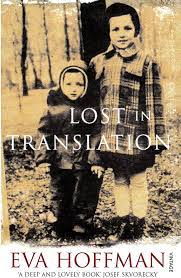
Eva Hoffman: Lost in Translation
If you are experiencing homesickness and difficulty in adapting to Spanish culture, then I highly recommend reading “Eva Hoffman: Lost in Translation”
This memoir captures the remarkable journey of Eva Hoffman, a Polish-American author and scholar. Published in 1989, the book has attracted a lot of praise and attention for its insightful exploration of themes such as identity, culture, and the immigrant experience.
In her memoir, Hoffman reflects on her personal experiences as an immigrant. Born in Cracow, Poland, she was forced to move with her family to Canada in 1959 at the tender age of thirteen in full adolescence. The narrative delves into the multitude of challenges she faced in her attempt to adapt to a new country, master a new language, and navigate the intricacies of assimilation and cultural transformation.
Hoffman presents a touching account of her struggle with a sense of ‘in-betweenness’, feeling like a stranger in both her native Polish culture and her newly adopted Canadian culture. She wrestles with existential questions of identity and belonging and explores how language and memory act as the architects of identity.
The title of the memoir, “Lost in Translation,” is a fitting metaphor that encapsulates the challenge of understanding one’s experiences, thoughts, and feelings when transitioning between different languages and cultures. More than just being Hoffman’s personal narrative, the book will strike a chord with anyone who has struggled, or is struggling to adapt to a new culture and language. Experiencing life in a new language.
“Lost in Translation” is a compelling memoir that provides invaluable insights into the immigrant experience and the complex task of balancing multiple cultural identities. It remains a pertinent and widely-read piece of literature that continues to be studied and cherished for its literary depth and sociological resonance.
Eva Hoffman faced various challenges as an immigrant to the United States in her youth, as recounted in her memoir Lost in Translation.
The most prominent struggle was the language barrier. English became her third language after Polish and French, which she had difficulties mastering. She struggled to learn and use English, resulting in isolation and difficulties with everyday tasks. This loss of her native Polish language and culture made her feel rootless and like an outsider who had lost her true sense of self. New words had become purely phenomes with no emotional content for her. She explains how the English word for milk, could not conjure the same emotional connection to the Polish word for milk, mleko, which was emotionally connected to warmth, safety and comfort.
Navigating American culture also proved challenging. Unfamiliar cultural references, social norms, and customs were all foreign to her. Forming new friendships and romantic relationships was a minfield due to cultural gaps and difficulties communicating. The education system, work culture, and social structures in the U.S. were different and took time and effort for her to adjust to and acclimate.
Even after immersing herself in American culture for decades, Hoffman still experienced a lingering feeling of foreignness and not truly belonging. As a foreign-born person with an accent, she also sometimes faced stereotyping and prejudice from Americans.
Challenges
Eva Hoffman’s struggles with language and culture had a profound impact on her sense of self and identity, as she recounts in Lost in Translation. Losing touch with her native Polish meant losing an integral part of herself and her cultural heritage. Her Polish identity became foggy and distant as she struggled to master English. While English allowed her to adapt to her new American life, it also isolated her and distanced her from her Polish culture.
Though she finally adapted to American life and culture over years, a lingering foreignness remained, marking her as perpetually “other” in American society. Hoffman struggled to fully integrate her Polish and American identities. They felt like parallel ideas in her mind that never merged into a unified sense of self. Her identity remained fragmented.
Resolution
Hoffman realized complete unity and resolution of her dual identities was impossible. Her Polish and American selves would always remain separate to some extent. Over time, she came to see both identities as valuable parts of who she had become. Rather than trying to unify them, she learned to appreciate the richness that came from their coexistence within her.
Ultimately, Hoffman realized that living between two cultures and languages had endowed her with a dual perspective that was invaluable. The fragmentation she once saw as a weakness became a source of richness and insight.
Take away
A key takeaway from Eva Hoffman’s memoir Lost in Translation is that immigrating and adapting to a new culture and language is challenging yet also enriching. The struggles and losses are real, but so are the potential gains. Hoffman eventually found a way to embrace a hybrid identity, though complete reconciliation of dual cultures within herself remained elusive.
Hoffman came to see that living between languages and cultures had endowed her with a dual perspective that fostered empathy, insight and inner growth, turning what was once fragmentation into richness and wisdom. Reconnecting with her roots and native language helped revive her sense of self.
If you need help in adapting to a new language and culture you can find a list of Englsh-speaking counsellors and therapists, many with first hand experience of cultural discolocation, in the ESHA Spain business directory
Leave a reply





Leave a reply